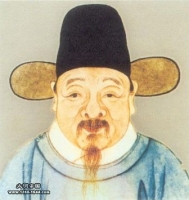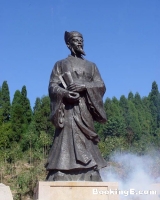| 籍贯: | 浙江青田 |
|
阅读刘基 Liu Ji在散文天地的作品!!! 阅读刘基 Liu Ji在百家争鸣的作品!!! 阅读刘基 Liu Ji在诗海的作品!!! | |
刘基出身名门望族,自幼聪明好学,有神童之誉。元至顺四年{1333年)23岁的刘基,一举考中进士,开始步人仕途生涯。他立志报国,但朝廷昏庸腐败,使他20余年的宦海生涯屡遭磨难贬抑。元至正二十年(1360年)三月,接受朱元璋的邀请,成为参赞军务的谋士,为明王朝的建立和发展,立下汗马功劳。他为人刚直,胆识过人,朱元璋尊其为“吾子房(张良)也”。民间有“上有诸葛孔明,下有刘基伯温”的称道。
至正二十年五月,陈友谅攻下了南京外围的重镇太平,杀了朱元璋的养子朱文逊及守将花云。他还在太平立国,自称皇帝。调集舟师,从江州向东直指应天。声称此役有张士诚配合,攻陷应天,指日可待。在陈友谅的嚣张气焰面前,朱元璋的部将感到局势紧张。有的主张出城决一死战,有的主张弃城转移,也有的主张献城投降。诸说纷纭,莫衷一是。朱元璋也一时拿不定主意,便问站在一边默不作语的刘基。刘基斩钉截铁地回答,先斩主降者和言逃者,才能破敌获胜。他说,陈友谅劫主称帝,骄横一世,其心无日不忘金陵。现在气势汹汹,顺江东下,乃是向我示威,逼我退让。我们不能让其得逞,只有坚决抵抗。他又说,常言道,后举者胜,陈友谅虽兵骄将悍,但他们行军千里来犯我,既是疲军,又是不义,而我们后发制人,以逸待劳,待敌深入后,我以伏兵击之,自当必胜。这一仗对我们来说关系重大,一定要打好。刘基的一番话,坚定了朱元璋抗击的决心,他采纳了刘基的计策,巧出奇兵打败了陈友谅的进攻。朱元璋不仅取得了保卫应天的胜利,还一鼓作气收复了太平。巩固了金陵这块根据地。此役仅在刘基投奔后的两个月,充分显示了刘基卓越的军事才能。
陈友谅虽退守江西、湖北一带,但他和张士诚仍然是朱元璋的主要劲敌。为了扫平群雄,北定中原,最后推翻元朝政权,朱元璋军中对东张西陈两个战略方向,持有不同的看法。多数将领主张先易后难,即先打张士诚。这一战略思想对朱元璋也产生了影响。
刘基的主张则相反,他认为张士诚生性怯弱,胸无大志,只求自保,这种人不足为虑。陈友谅野心勃勃,力量也强,又据长江上游,对我威胁最大。若先打张士诚,陈友谅定会乘虚攻我;可是如果先讨伐陈友谅,张士诚则不一定敢轻举妄动。故当先除陈。陈氏一灭,张氏自孤,存亡便由我了。陈张既平,就可拥麾北上,席卷中原,大业便可告成了。刘基的分析高瞻远瞩,应该说是朱元璋扫平四海、建立大业的唯一正确战略方案。朱元璋采纳刘基之计,决定先征陈友谅,再攻张士诚,在全面胜利的道路上迈出了举足轻重的一步。
至正二十一年(1361年),朱元璋亲率三军溯长江西征陈友谅。先攻安庆不克,刘基知陈友谅重兵驻防安庆,其老巢江州(今江西九江市)必定空虚,便建言马上转攻江州,果然一举而下,陈友谅弃逃武昌。不久,陈友谅部臣江西行省丞相胡廷瑞以保留部队为条件前来议降,朱元璋从刘基劝,接受胡的条件。胡降,其他守将见此纷纷前来纳款,整个江西很快并入朱元璋的版图。至正二十三年(1363年)四月,陈友谅乘朱元璋北上解小明王韩林儿安丰被围之际,从武昌率军倾城而出,围攻洪都;想守回这一重镇。守将朱文正力拒抵抗,两军相持多日。七月,朱元璋率大军南下,与陈友谅决战于鄱阳湖上。刘基日夜侍随朱元璋左右,参与军机。两军鏖战,血染湖水,双方死伤惨重,最后在湖面上相持不下。这时刘基向朱元璋献计,建议派重兵扼守鄱阳湖四周出口之处,以困陈友谅。不久,陈友谅率残军突围。想从小港汊口处逃窜,结果被朱元璋军扼住。陈友谅战死,余军大溃。消灭陈友谅势力以后,朱元璋马不停蹄,立即又挥戈东进,征伐张士诚。至正二十七年(1367年)九月,攻占平江(今江苏苏州市),张士诚走投无路,自缢身死。自此长江中下游地区尽归朱元璋所有。朱元璋对刘基说:“先生是我创立江山的第一等功臣。”
刘基还有许多出其不意的战术,每遇战事往往以奇计制胜。在打江州时,他见江州城墙沿江而筑,又很低矮,便授意在战舰上建造云梯天桥。夜间驶到城墙脚下,将天桥架在城墙上,士兵缘梯而上,顺利破城。至正二十三年(1363年)他奔母丧从处州返金陵,途经严州(今浙江建德县),正适张士诚部来犯,严州守将李文忠要出兵迎击,刘基劝阻说,不出三日,敌人会自己退走,到时出兵追击,可获大胜。李文忠听从了刘基的劝说。第三天黎明,敌军果退,李文忠出击,大胜而归。
刘基的运筹帷幄、神机妙算不仅使同僚下属钦佩不已,也博得了朱元璋的信任与尊敬。朱元璋将他比作汉代谋臣张良、尊称他“老先生”而不呼其名,经常和他一起商量军政大事,有时遇有重大决策,仅召他一人进密室相议,一谈便是半日。朱元璋有时对他几乎到了依赖的程度。刘基母亲故世,他想告假回乡奔丧,朱元璋舍不得他离开,婉言挽留而不准假。后来勉强准了,还不时写信到青田乡里请教军政大计,刘基则详细分析答复,总使朱元璋非常满意。尽管这样,最后朱元璋还是提前召他回来。见人主如此诚意待己,刘基也以朱元璋为不世之遇,悉心辅佐,知无不言,为朱氏大明王朝的建立作出了不可磨灭的贡献。
他的著作有《郁离子》等,《郁离子》全书二卷,凡十八篇,一百九十五条,每条多则千言,少则百字,主要是针砭时政的语言或故事。其文构思精巧,文笔犀利,富于情趣,发人深省。作者借假托人物郁离子之口,发表对社会、世态人情的看法。有些见解,至今仍能给读者以深刻的启迪。
【刘基故居】故居为五开间。1311年6月15日,刘基生于此;1375年4月16日死于此。现存有刘基48岁弃官归隐后修建房舍碑志,石臼等用物。《明史•刘基传》载:“洪武四年正月赐老归,惟饮酒,奕棋,口不言功。邑令求见不得,微服为野人谒见。基方濯足,令从子引入茅舍。”由此可见刘基当时住房的简陋,品格的高尚。
刘基作品《百战其略》编写说明
白话百战奇略》由提示、译文、原文、注释、附录五部分组成,现依次逐项说明如下:
(一)、“提示”:包括两部分内容,一是扼要概括每篇“论述”的中心内容和精神实质,指出其所论与古典兵学理论的渊源关系以及其可取性或局限性。二是着重剖析每篇“史例”在作战指导上的得失与作战成败的关系,以及可供借鉴的经验教训。由于该书所引史例多数比较简略,故笔者一般都以史例原著进行分析,而分析中的引文,凡与《百战奇略》相同的,不再注明出处,不同或为其所无者,均括注出处。
(二)、“译文”:在忠实于原意的前提下,力求做到准确无误、通俗畅达、生动可读,符合军事用语。如因原文成分残缺或过于简略而影响文义连贯处,所补之译文部分,一般都加圆括号“( )”。
(三)、“原文”:以明弘治十七年(1504年)马思进《武经总要·百战奇法》刻本为底本(简称“马本”),以明万历二十七年(1599年)唐富春《武经总要·百战奇法》刻本(简称“唐本”)和王鸣鹤《登坛必究·百战》刻本(简称“王本”,但该刻本仅存录《百战奇法》前集之五十战)、崇祯九年(1636年)所刻《韬略世法》丛书收录的《百战奇法》之汪淇参订本(简称“汪本”)为参校本,对照有关正史原著进行校勘的,凡是重要校正处,均在本书“注释”中加以说明,不另出校记。原文校勘中需要强调说明的问题有二:
其一、该书所引古代兵法(即“法曰”内容),凡与原著不同且影响原意的,均据原著校改,并在“注释”中说明校改理由;引文字词虽与原著不同,但不影响原意的,一般只注明原文,不作文字改动;凡引文脱漏成分,则补足后加方括号“〔 〕”。
其二、该书所引的史例,凡引文与史籍相悖者,均据原著予以订正;引文字词虽与原著不同,但并未改变原意的,一般不再更改;引文凡有重要脱漏,不补则影响文义连贯完整或者减煞该书军事特色的,则据史书原著予以增补,所补成分加方括号“〔 〕”。
(四)、“注释”:力求准确、简明,一般不作字源、词源考证。注释的主要内容是:生僻字词释义,重要专用术语,兵法引文及史例出处,历史人物及地名,重要校勘注文和足以证明其成书时代的避讳文字。这里需要着重说明的,史例中所涉及的历史人物,一般都加注释,但同一人物在不同篇目中多次出现时,只注释首次;战例中所涉及的历史地名,一般都注明今地名,但同一朝代的同一地名,虽在不同篇目史例中多次出现,只注释首次,不同朝代的同一地名,则分别注释。
(五)、“附录”:为便于读者了解该书的成书时代及作者等问题,本书末附录拙文二篇:1、《百战奇略》不是明代刘基的著作;2、《〈百战奇略〉辨伪》质疑。
Career
Liu Ji served Zhu Yuanzhang in his rebellion against the Mongol-led Yuan Dynasty in China, which had ruled since the conquest of the Southern Song Dynasty in 1279. Liu Ji dabbled in many fields of statecraft, philosophy, scholarly works, and technology. His philosophical outlook was that of a skeptical naturalist, and he became interested in astronomy, calendrical science, magnetism, and fengshui. He was known to be a friendly associate of the mathematician and alchemist Zhao Yuqin, and collaborated with his contemporary general and scholar Jiao Yu to edit and compile the military-technology treatise of the Huolongjing, which outlined the use of various gunpowder weapons. He was very interested in the latter, and once said that "thunder is like fire shot from a cannon".
Early Service in the Yuan Dynasty
Liu Ji earned his Jinshi degree in the final years of the Mongol Yuan Dynasty, and spent much of his early career attempting to save the dynasty from collapse. Liu served the Yuan as an official for 25 years, gaining a reputation for integrity and honesty, and became known as a distinguished scholar and strategist. In 1348, Liu was appointed to a military position and assigned to put down a southern rebellion against the dynasty. The leader of the rebellion attempted to save himself by offering Liu a bribe. When Liu refused, the rebel went to Beijing and succeeded in bribing his way into favour there.
Once the secessionist had bribed his way into the regime's favour, he was given a public office and a salary. Liu Ji's relationship with the Yuan deteriorated after this event. Liu attempted to resign twice, in 1349 and 1352. He was demoted in 1358, and finally left service to retire in his ancestral homeland. In 1366, when he was fifty-five, Liu was introduced to Zhu Yuanzhang, a former leader of a radical White Lotus Buddhist rebellion who was then the leader of a broad anti-Yuan rebellion.
Service to Zhu Yuanzhang
Liu Ji served not only in the administration of Zhu Yuanzhang, but also in many battles as a commanding officer on land and water, leading the early Ming naval forces. Zhu Yuanzhang placed Liu Ji in charge of the campaign to conquer all of Zhejiang from Yuan forces. Liu was also responsible for military ventures against opposing Chinese rebel groups, as well as coastal Japanese pirates. His forces owed much of their success to the use of the medieval Chinese firearm known as the fire lance. It was during this period that he wrote the books Extraordinary Strategies of a Hundred Battles (百戰奇略) and Eighteen Strategies and Affairs (時務十八策). Later in the rebellion Zhu only rarely relied on Liu to personally command his armies in the field, as he acquired other capable generals, including Xu Da, Deng Yu and Chang Yuchun. Liu was most often consulted for his strategic advice during this period.
In 1368, after eight years of Liu Ji's service, Zhu Yuanzhang unified China. When Zhu founded the Ming Dynasty, Liu was one of his most trusted advisors, but the relatiohship between Zhu and Liu eventually deteriorated in a manner similar to the way that Liu had become estranged from the Yuan government. In 1375, Liu rejected a man, Hu Weiyong, for appointment to high office. Hu later obtained an audience with Zhu Yuanzhang and slandered Liu by telling Zhu that Liu was plotting to establish his own power. After convincing Zhu of Liu's treachery, Liu was ejected from office, and Hu Weiyong was promoted.
Death
The shock and shame of being groundlessly dismissed from office destroyed Liu's health, and he quickly died. Within five years of Liu's death the man who had slandered Liu to achieve office was himself suspected of plotting against Zhu Yuanzhang. In the subsequent orgy of Zhu's paranoid efforts to root out conspiracy, 30-40,000 people were executed.
The precise cause of Liu Ji's death is considered uncertain by modern scholars. Some scholars believe that Liu was poisoned by emperor Zhu Yuanzhang himself, not because Liu failed his duty, but because the emperor was envious and even fearful of his knowledge and influence. Other sources have pointed out that the emperor did kill many people shortly after Liu lost his official position, but they are uncertain about whether Liu was part of this group.
Prophecy
Liu Ji's most famous prophecy to Zhu Yuanzhang, written down in a lyrical style, is called the Shaobing Song (燒餅歌). The poem is written in cryptic verse and is difficult to understand. Some people believe that the Shaobing Song has predicted future events in China, including the 1449 Mongol invasion, and the 1911 founding of the Republic of China.
Biographical work
Liu Ji's official biography is found in the 128th chapter of the Ming Shi. The author Chong Tai also wrote a biography on him.
In popular culture
Shenji Miaosuan Liu Bowen (simplified Chinese: 神机妙算刘伯温; traditional Chinese: 神機妙算劉伯溫; pinyin: Shénjī Miàosuàn Líu Bówēn; literally "The Divine Witted and Marvelous Predictor Liu Bowen"), a 404 episodes long television drama about Liu Bowen, was aired on Taiwan's TTV from 23 August 2006 to 12 March 2008, starring Taiwanese actor Huang Shaoqi (黃少祺) as Liu Bowen.

